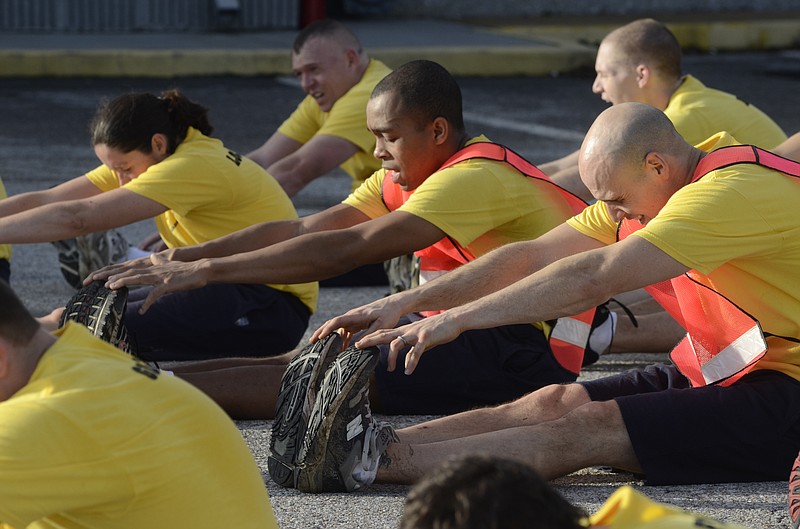The number of minority officers in the Chattanooga Police Department is the highest it has been in at least five years, despite recent criticism from a local civil rights group.
"I think it's important for the African-American community and especially African-American kids to see people in a position of authority," said Chattanooga Police Chief Bobby Dodd, "to see people in a position in law enforcement -- someone they can identify and look up to and maybe look to for guidance if they are interested in coming into law enforcement."
As of this month, records show the department has a total of 81 black officers, or 18.8 percent of the total; 12 Hispanic officers, 2.8 percent; and five Native American officers, 1.2 percent. There are 334 white officers, or 77.3 percent, on the force.
But an official with the local NAACP said that, despite the increases in minorities on the force, more black officers are needed to more closely match Chattanooga's population.
The city has a population of 167,674, according to the 2010 U.S. census. Of that, 58 percent of residents are white, 34.9 percent are black, 5.5 percent are Hispanic, 2 percent are Asian and 0.4 percent are Native American.
"If you think where we are now and the issues we're facing, I think we're going back in the way we address policing in Chattanooga," said Joe Rowe, first vice president of the Chattanooga chapter of the NAACP. "Just as a rule of thumb, as you look at the population, you would think we would need 150 African-American officers."
Dodd said the number of minorities has increased since he became chief 19 months ago.
In 2010, records show, there were 63 black officers, or 14.8 percent, seven Hispanic officers, 1.6 percent, and five Native Americans, 1.2 percent. There were 263 white officers, or 61.6 percent, at the time.
"I don't agree that we have problems dealing with minority communities be it African-American or Hispanic," Dodd said. "We've reached out."
There have been three police academies since then with one now under way. Out of the group of 29 cadets now in the academy, 24 are white, four are black and one is Asian.
The issue of hiring black officers, as well as other minorities and women, is seen in law enforcement across the nation, according to experts.
"I think some of the challenges of recruiting minorities and women, and bringing them into a profession that was, in not-so-recent history, mostly white males," said Vic Bumphus, associate professor of criminal justice at the University of Tennessee at Chattanooga who is black. "So there's been a lot of integration in the last few decades, and of course, there are some challenges. How do you get minority candidates who have been somewhat ambivalent toward the police historically to join the police?"
Blacks represented 11.7 percent, or 52,853 officers, of the nation's law enforcement population in 2003, according to the most recent study published by the federal Bureau of Justice Statistics. That's an increase from 9.3 percent compared to the law enforcement population in 1987.
"We learned some time ago in policing we can't police the community without the support of the citizens," Bumphus said. "You want a police department that might respect your kind of freedoms as well as the freedoms of all people."
Dodd said he has recruited minorities from out of state and across the country. He said he also has invited local pastors to send him promising candidates although to date no candidates have been submitted. Sometimes members of the department go to colleges to look for recruits, he said.
"He's done a great job in trying to make it a more diverse police force. That kind of attitude he has is the kind of attitude to have. He works diligently to get some of the officers there," Bumphus said. "When you think about gangs and inner-city types of issues, you often think about populations that are at risk and, all too often, they might be lower-class minority populations. Having information about those kinds of communities is important as well."
Reuben Justice, 30, of Harrison, one of the black recruits on the Chattanooga police force, said that, in some cases, he may be able to reach out better to other black residents during calls, "but when it comes down to it, we're not white officers. We're not black officers. We're not Asian officers. We're Chattanooga police officers and that's the bottom line."
Montague Hicks III, 29, of Chattanooga, a white recruit in the academy, said while he agrees with that sentiment, many in the public want to deal with someone who understands their culture.
"I do agree if you're dealing with lots of groups of people, you're normally more comfortable, many times -- the public is -- if they're dealing with someone who is the same nationality," Hicks said. "I think it's important and there's enough qualified people and so many different races. I'm glad our department does have diversity there."
